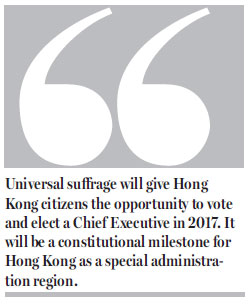Universal suffrage is really the only poll that matters
Updated: 2015-04-20 09:18
By Chan Tak-leung(HK Edition)
|
|||||||||
Chan Tak-leung says some survey results of the Public Opinion Program, which has connections with 'Occupy' initiators, are unscientific and unreliable
The Alliance for True Democracy (ATD) has, since 2013, been commissioning the Public Opinion Program (POP) at the University of Hong Kong to conduct surveys on issues relating to constitutional reform in the SAR.
Its latest poll was a March telephone survey. For the purpose of accuracy, here is the exact wording of the question posed, "There were views expressed that the NPCSC 831 decision will result in false universal suffrage for the CE in 2017, do you agree or disagree?"
Random participants were asked to what extent they agreed or disagreed with the statement on a scale from 0 to 10. Zero and 10 represent the two extremes of total agreement and total disagreement, while a score of 5 would mean a 50-50 choice - the view of those undecided on whether or not they agreed.
Firstly the question was framed in such a way that assumed potential participants would understand exactly what was being asked - who expressed these views? What has been decided by the NPCSC? How can universal suffrage (one person, one vote) be wrong? Despite the problems this question entails, the ATD was delighted with the results of the survey. It claimed that 41 percent of the 1,000 or so participants agreed with the statement while 28 percent disagreed.
But I believe their delight is unjustified. Any casual observer of these surveys can see that, along with previous POP surveys conducted for ATD, this one was unscientific, and neither independent nor academically sound. I will explain why.
According to the disclaimer published under "Background Information of the Survey" provided on the POP website: "The research instrument used in this study was designed entirely by the POP team after consulting the Alliance for True Democracy, all fieldwork operations, data collection and analysis were carried out independently by POP. In other words, POP has full independence in the survey design and operation and would take full responsibility for all the findings reported herewith".
However, the director of POP was none other than Robert Chung Ting-Yiu who allegedly received financial support from Benny Tai, one of the organizers of the failed "Occupy Central" movement which campaigned for "real universal suffrage". Both Chung and POP's independence and neutrality are tainted by their links to "Occupy".
Secondly, the results of the survey were plain for all to see. I noticed that 23 percent of participants were still undecided (the 50-50s). POP did not even consider them worthy of mention. I would suggest that researchers remain more skeptical of the silent minority in their surveys. In this case, this group amounted to nearly a quarter of respondents - a far greater proportion than the 3.1 percent margin of error allowed for by this survey.
The same applies to the daily election polls which have appeared daily in Britain's media since election campaigning started a few weeks ago. With three weeks to go and the major political parties very close in the polls, it is still unclear who will win. In 2010, there was a hung parliament. There may be a repeat of that result this time due to the undecided voters.
The outcome of Hong Kong's second round of consultations on constitutional change will soon be published. Those who are still undecided about this will have an opportunity to examine improvements to the composition of the Nominating Committee. They are the ones who will come round to supporting universal suffrage and rejecting "public nomination" as promoted by the ATD and other "pan-democrat" legislators and activists.
The Chief Executive is correct in putting his trust in the wisdom of the electorate and ignoring the results of unprincipled surveys delivered by POP. Universal suffrage will give Hong Kong citizens the opportunity to vote and elect a Chief Executive in 2017. It will be a constitutional milestone for Hong Kong as a special administrative region. The world will see that through hard work, common sense and diligence, Hong Kong people are building a better future. I hope people will put their faith in the "One Country, Two Systems" policy and the Basic Law. This makes far more sense than putting your trust in yet another meaningless survey.
The author is director of the Chinese in Britain Forum. He was the first-ever Chinese British citizen to be elected mayor of the Greater London Borough of Redbridge (2009-10) and served as a member of the city council for over 10 years.

(HK Edition 04/20/2015 page10)